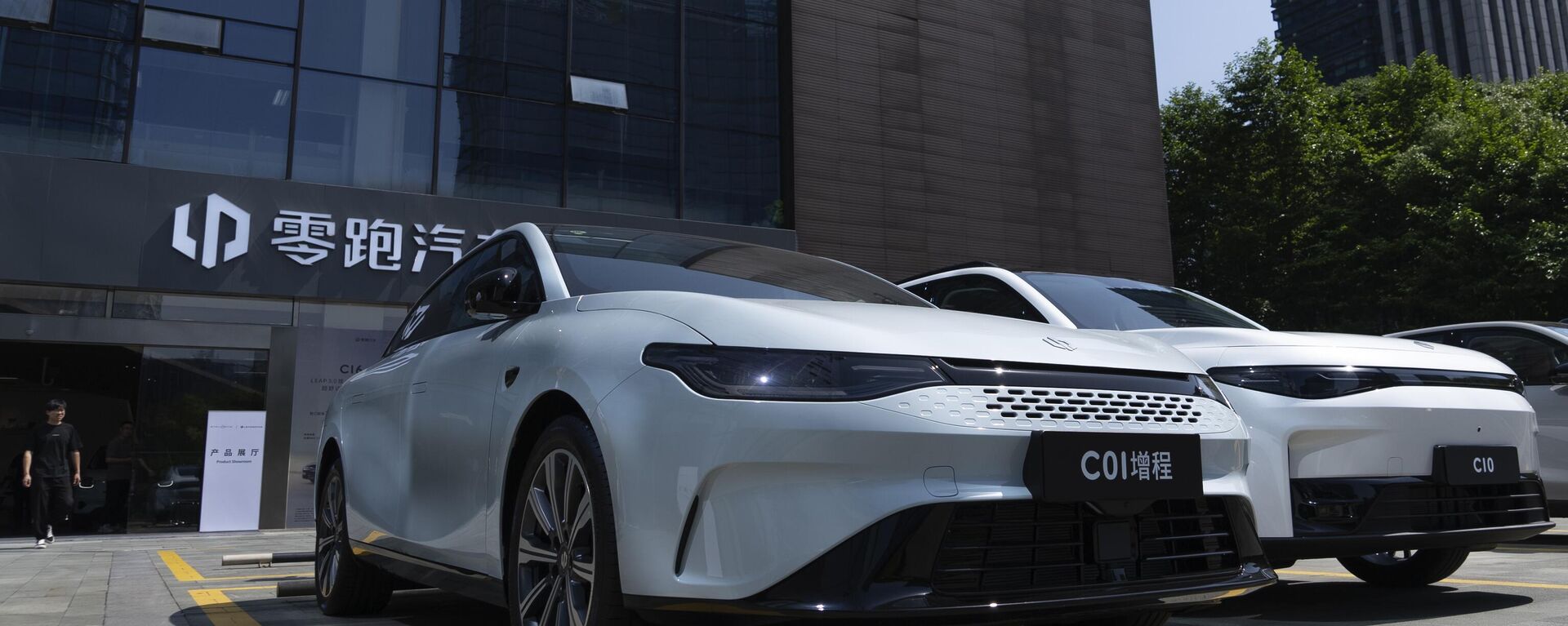https://sputnikglobe.com/20240926/us-escalates-tensions-as-china-conducts-missile-test-in-pacific-1120290802.html
US Escalates Tensions as China Conducts Missile Test in Pacific
US Escalates Tensions as China Conducts Missile Test in Pacific
Sputnik International
The Chinese Defense Ministry said the launch was part of its annual exercises, while the China Central Television reported that the missile fell into the planned sea area.
2024-09-26T01:14+0000
2024-09-26T01:14+0000
2024-09-26T01:14+0000
analysis
americans
china
washington
chinese defense ministry
pacific
antony blinken
us navy
chinese navy
tariff war
https://cdn1.img.sputnikglobe.com/img/07e8/09/1a/1120291389_0:27:3072:1755_1920x0_80_0_0_5f77cbec2c7b6e07275d26e506311cf4.jpg
On Wednesday, China announced that they had successfully test-fired an intercontinental ballistic missile carrying a dummy warhead into the Pacific Ocean’s high seas. The Chinese Defense Ministry said the launch was part of its annual exercises, while the China Central Television reported that the missile fell into the planned sea area."This launch was carried out as part of the annual training plan, it is in accordance with international law and international practice, it is not directed against any particular country or target," the ministry said in a statement on WeChat.KJ Noh, a scholar, journalist and geopolitical analyst specializing in the Asia-Pacific joined Sputnik’s Political Misfits on Wednesday to discuss what is surely becoming a second Cold War. “The US is preparing for war with China. It has been since at least 2009. It's accelerated its pace. And the Navy just released a navigation plan 2024, which essentially it calendars a date for war with China by 2027. They claim deterrence, but the deterrence is so aggressive and forward leaning that you can only see it as provoking a war,” the analyst explained. “Now, the question here is, can the US win a war against China? The simple answer is no.”The US announced a tariff hike on Friday targeting an array of Chinese-made goods, including a 100% duty on electric vehicles, a 50% levy on Solar cells and 25% on steel, aluminum, EV batteries and key minerals. Automakers warned that the tariff could disrupt supply chains - a warning that the US blatantly ignored. Washington maintains the suspicion that cars with devices that are connected to the internet or cloud services are vulnerable to hacking attacks. The ban on software could be put into effect as soon as the 2027 model year, with prohibitions on hardware set to occur in January of 2029, Sputnik recently reported.China, a leader in electric vehicles and components for smart cars, has insisted it respects both the security of its foreign customers and the principles of fair competition.“[The US] is afraid that China is going to do to the US what the US clearly has the capacity to do around the world. And because of this, it wants to shut down EVs and, essentially, prevent any Chinese EV or Chinese tech, really, internet-connected tech from coming in,” he added.In one week, the US House of Representatives approved 25 anti-Chinese laws in bipartisan votes. US efforts to undermine China are one of few issues “both Republicans and Democrats can agree on”, US media noted. One of the bills passed included the “Countering the PRC Malign Influence Fund Authorization Act”, which will give $1.63 billion to the State Department and USAID over five years that will fund organizations that spread anti-China propaganda worldwide.A report from Geopolitical Economy noted that the “second Cold War” seems to be reaching a critical point as CIA Director William Burns referred to China as the “biggest long-term threat”, while “the last two US secretaries of state, Democrat Antony Blinken and Republican Mike Pompeo, gave speeches specifically dedicated to demonizing China.”“But, it signals an escalating information war, which signals a preparation for kinetic war. And it's really about manufacturing consent for war, delegitimizing China, demonizing China, making everybody afraid of China, making everybody think China is a threat. And it also asserts US narrative dominance, which is absolutely necessary because the information sphere is a theater of war."
https://sputnikglobe.com/20240922/biden-administration-mulling-ban-on-chinese-smart-car-software-amid-trade-spat-1120249707.html
https://sputnikglobe.com/20240924/china-urges-win-win-cooperation-as-us-sees-zero-sum-game-1120266713.html
china
washington
pacific
Sputnik International
feedback@sputniknews.com
+74956456601
MIA „Rossiya Segodnya“
2024
News
en_EN
Sputnik International
feedback@sputniknews.com
+74956456601
MIA „Rossiya Segodnya“
Sputnik International
feedback@sputniknews.com
+74956456601
MIA „Rossiya Segodnya“
ev tariffs, china's test-firing, chinese defense ministry, chinese army, chinese forces, chinese nuclear forces, chinese nukes, chinese icbm, chinese missiles, chinese electric vehicles, electric vehicles, amreican tariffs, american ban
ev tariffs, china's test-firing, chinese defense ministry, chinese army, chinese forces, chinese nuclear forces, chinese nukes, chinese icbm, chinese missiles, chinese electric vehicles, electric vehicles, amreican tariffs, american ban
US Escalates Tensions as China Conducts Missile Test in Pacific
Rocketry has played a key role in China’s development, helping the country to grow to become the world’s second-largest economy. But despite China’s “no first use” of nuclear weapons policy, the US’ continued provocations may be met with harsher displays of deterrence.
On
Wednesday, China announced that they had successfully test-fired an intercontinental ballistic missile carrying a dummy warhead into the Pacific Ocean’s high seas. The Chinese Defense Ministry said the launch was part of its annual exercises, while the China Central Television reported that the missile fell into the planned sea area.
"This launch was carried out as part of the annual training plan, it is in accordance with international law and international practice, it is not directed against any particular country or target," the ministry said in a statement on WeChat. KJ Noh, a scholar, journalist and geopolitical analyst specializing in the Asia-Pacific joined Sputnik’s
Political Misfits on Wednesday to discuss what is surely becoming a second Cold War.
“I think [China is sending] a very clear signal. I mean, there are multiple messages that are being sent. Some people are saying that because there were some high profile firings of the leaders of the rocket force, this is a message from China stating; ‘we are still highly functioning, you know, don't get any ideas.' But also in the current geopolitical environment, I think it's a very, very clear signal to the United States,” Noh explained.
“The US is preparing for war with China. It has been since at least 2009. It's accelerated its pace. And the Navy just released a navigation plan 2024, which essentially it calendars a date for war with China by 2027. They claim deterrence, but the deterrence is so aggressive and forward leaning that you can only see it as provoking a war,” the analyst explained. “Now, the question here is, can the US win a war against China? The simple answer is no.”
“So how will it win and fight the war? It's now becoming very public. CNAS, you know, which is very, very important in determining strategic policy, has said that the US must integrate nuclear weapons seamlessly into war games and war planning with China. In other words, war with China will go nuclear,” he added. “And so, here, I think China is sending a very clear message; ‘you think that you can get away with a nuclear sucker punch? Don't think about it. You think you can have a limited nuclear war in theater? Don't think about it."
The US announced a tariff hike on Friday targeting an array of Chinese-made goods, including a 100% duty on electric vehicles, a 50% levy on Solar cells and 25% on steel, aluminum, EV batteries and key minerals. Automakers warned that the tariff could disrupt supply chains - a warning that the US blatantly ignored.
Washington maintains the suspicion that cars with devices that are connected to the internet or cloud services are vulnerable to hacking attacks. The ban on software could be put into effect as soon as the 2027 model year, with prohibitions on hardware set to occur in January of 2029, Sputnik recently reported.
“Well, certainly it's not going to protect American jobs. I mean, on that level, it's going to fail because the US doesn't do manufacturing anymore,” Noh explained. “[Are the tariffs] going to protect data? I certainly doubt it. US corporations leak data like a sieve and nothing that they would use China has really shown to have any evidence behind it.”
China, a leader in electric vehicles and components for smart cars, has insisted it respects both the security of its foreign customers and the principles of fair competition.
“But I think the real issue here is a national security issue, but not quite in the way they think it is,” Noh continued. “...the US has actually set up with its electronic panopticon and its connected internet [...] which the US has set up so that it can turn it on and turn it off at will. We know that the US actually does this. If you buy an F-35 from the US and then they don't like what you're doing with the plane or don't like the direction that it's going, they can shut it off mid-flight.”

22 September 2024, 17:08 GMT
“[The US] is afraid that China is going to do to the US what the US clearly has the capacity to do around the world. And because of this, it wants to shut down EVs and, essentially, prevent any Chinese EV or Chinese tech, really, internet-connected tech from coming in,” he added.
“China is the world leader in renewables and EVs and new energy vehicles and new energy technologies, essentially going green means going red,” the analyst said. “But, from the US standpoint, they don't want that. They do not want energy transition if it means the Chinese are going to be leading it. So, they would rather be dead than red. The US would rather burn up the planet than give China its place in the sun.”
In one week, the US House of Representatives approved 25 anti-Chinese laws in bipartisan votes. US efforts to undermine China are one of few issues “both Republicans and Democrats can agree on”, US media noted. One of the bills passed included the “Countering the PRC Malign Influence Fund Authorization Act”, which will give $1.63 billion to the State Department and USAID over five years that will fund organizations that spread anti-China propaganda worldwide.
A report from Geopolitical Economy noted that the “second Cold War” seems to be reaching a critical point as CIA Director William Burns referred to China as the “biggest long-term threat”, while “the last two US secretaries of state, Democrat Antony Blinken and Republican Mike Pompeo, gave speeches specifically dedicated to demonizing China.” “...we know that the USAGM already spends $950 million a year on, essentially, propaganda. This would give another close to $400 million a year to do overseas operations and to essentially do massive propaganda, massive information operations to demonize and delegitimize China,” Noh added.
“...this kind of propaganda is not simply harmful to, you know, the cultural informational sphere. It can be physically dangerous. The other way this can be dangerous is that it results in an increase of attacks on Asian Americans around the world and in the US as well," he added. "When you demonize a group preparing to attack them over here, don't be surprised if people take that message and attack the same people, Asians, over here.”
“But, it signals an escalating information war, which signals a preparation for kinetic war. And it's really about manufacturing consent for war, delegitimizing China, demonizing China, making everybody afraid of China, making everybody think China is a threat. And it also asserts US narrative dominance, which is absolutely necessary because the information sphere is a theater of war."

24 September 2024, 04:35 GMT




